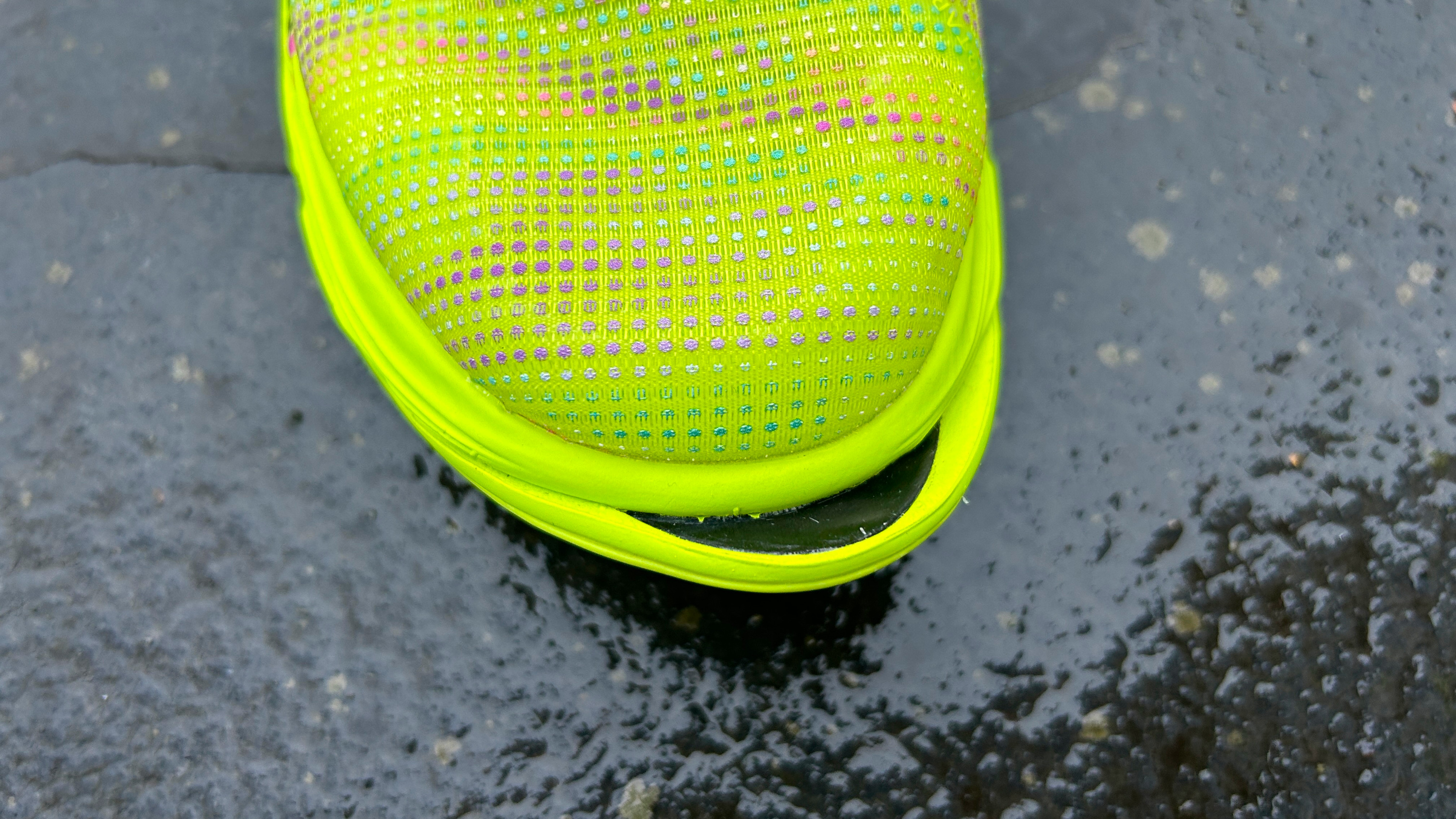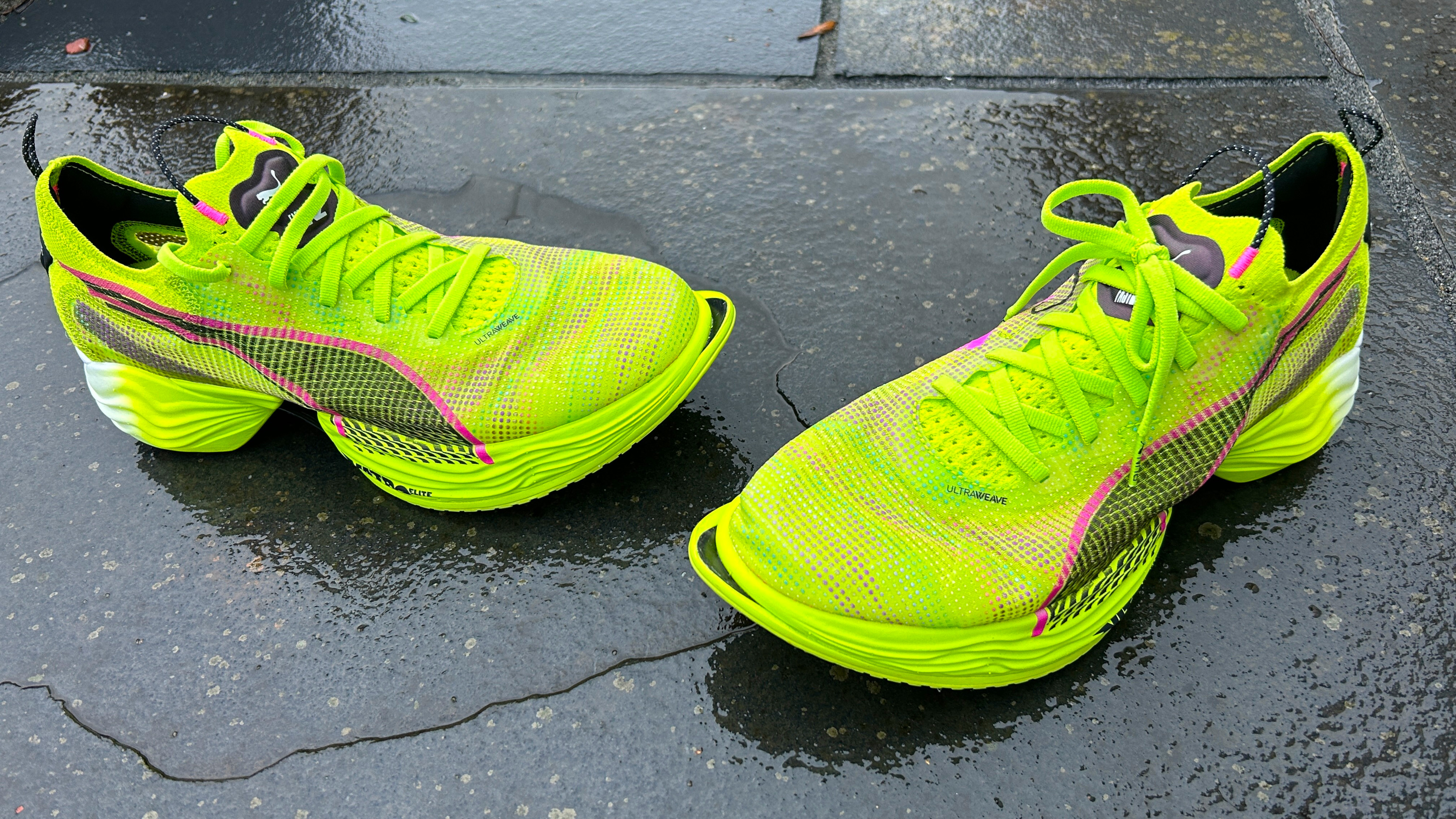
The original Puma Fast-R Nitro Elite turned heads with its eccentric design, which featured a decoupled midsole with separate chunks of foam under the heel and forefoot.
Puma has kept the decoupled design, but made other notable changes such as increasing the stack height and using a new midsole foam. The Puma Fast-R 2 is a bouncy and impressively propulsive racer, especially for the marathon, and stands up well against the best carbon plate running shoes—even if there are some I prefer like the Nike Vaporfly 3 and Nike Alphafly 3.
Puma Fast-R 2 Nitro Elite: Price And Availability
The Puma Fast-R 2 was announced in November 2023 and there was a limited release of the Ekiden colorway I tested in December, with the full launch on February 22, 2024. It costs $260 in the US and £230 in the UK, which is a $10/£10 rise on the price of the original Fast-R.
How I Tested This Shoe
I've run 30 miles in the Puma Fast-R 2, completing two hard training sessions as well as an all-out parkrun and an easier training run. I’ve also tested Puma’s other carbon plate racers, including both generations of the Deviate Nitro Elite and the Fast-FWD, as well as the original Fast-R.
Design And Fit
The Puma Fast-R 2 has all the usual ingredients of a modern racing shoe, with a high stack of bouncy lightweight foam and a carbon plate running through the midsole, but there are design innovations that make it stand out from the crowd.
For starters, the Nitro Elite foam in the midsole is not a Peba-based material. It is made from aliphatic TPU, which Puma says returns more energy. Most of the best racing shoes use Peba foams so it’s a bold move from Puma.
The first Fast-R had two different foams in its midsole, with a firmer EVA foam for the heel chunk and the Peba-based Nitro Elite in the forefoot. The Fast-R 2 uses the same updated Nitro Elite foam throughout the midsole and it is notably softer under the heel. The new shoe also has a higher stack than the original Fast-R, with the Fast-R 2 standing 40mm tall at the heel and 32mm at the forefoot for an 8mm drop.
Puma has also bucked convention with its carbon PWRPLATE, which extends beyond the midsole to create what looks like an underbite. This design is meant to create extra leverage and propulsion from the plate.

The Ultraweave upper is a lightweight material that has strips of Puma’s PWRTAPE on it to add stability. The heel fin that sticks out from the back of the shoe acts as a heel counter for added support there. I found the toe box fit was good in my normal running shoe size, but the heel design did irritate my Achilles tendon a little if I used the shoe for longer runs.
A cut-out on the forefoot of the shoe helps to reduce its weight, as does the decoupled midsole, but the Fast-R 2 is still pretty heavy for a racing shoe. It’s 9oz/255g in my UK size 9, which is 0.6oz/17g heavier than the original shoe. Puma suggests the Fast-R 2 is for more powerful runners who benefit enough from the extra propulsion of its design to overcome the weight gain, while those seeking a lighter shoe are better served by the Deviate Nitro Elite 2.
The outsole of the shoe is made from a thin layer of Pumagrip that covers the forefoot, with two sections of rubber at the heel. This grips exceptionally well on greasy and wet asphalt, and Pumagrip has also proved durable for me with Puma’s other racing shoes.

Running Performance
Like the original Fast-R, the Fast-R 2 feels odd and unwieldy when running at easy paces—the two chunks of foam in the midsole feel disconnected. Once you get up to your race paces, however, the ride is smoother and it’s certainly bouncy—much more so than the original shoe.
The midsole foam combined with the plate does produce a highly propulsive ride, and while the shoe doesn’t feel light and nimble it’s certainly fast thanks to the amount of spring it puts into your step. It’s also more comfortable than the original Fast-R, which I found would give me forefoot discomfort if used for long hard runs, something I didn’t experience at all with the Fast-R 2.
My first run in the shoe was an hour-long progression run, doing 20 minutes apiece of 6min/mile, 5min 42sec/mile and 5min 30sec/mile paces. The Fast-R 2 was ideal for this run. The booming bounce of the shoe helped me roll through the session well while the Pumagrip outsole provided reliable traction on a slightly slick all-weather park path.

It didn’t feel like a shoe that would work well for a short race, but when I did a parkrun in the shoe it was surprisingly quick. It doesn’t help the legs turn over quickly, or have the aggressive tip forward I get from the Nike Vaporfly, but the bouncy midsole protects the legs and helps to push you forward.
I also ran a session of 10 two-minute reps in the shoe, and again I was surprised by how fast and explosive it felt for these shorter efforts. Still, I preferred wearing it for the longer session—if I was picking a race to wear the Fast-R 2 in, it would be a marathon.
It feels like a shoe that will suit certain runners better than others. If you are a stronger runner with more of a loping stride who puts more force into the shoe, it will deliver more bounce. I’m more of a shuffling runner, especially when tired, and rely on a high cadence more than stride length for speed, so a lightweight shoe like the Deviate Nitro Elite 2 feels a little more natural to me late on in hard runs or races. That said, the Fast-R 2 does feel quicker overall despite this, and I think it’s Puma’s best racing shoe to date.
With regards to the innovative features of the shoe, some work better than others. The aliphatic TPU foam feels very bouncy, though a little firmer than some Peba-based foams like Nike’s ZoomX. The extra-long carbon plate didn’t do a lot for me, aside from making me nervous about jabbing someone when running in a pack; trimming that back to the forefoot of the shoe might save a little weight, which is something the Fast-R 2 could benefit from because it’s among the heavier super-shoes.
Is The Puma Fast-R 2 Nitro Elite Worth It?

The Puma Fast-R 2 is a great racing shoe and a fantastic option for the marathon. I’m not sold on every innovation Puma tried with the shoe, but I do like the new foam and it feels like a shoe that will benefit runners with a longer stride than me.
As with all new carbon shoes, the problem is the competition, especially from long-established favorites like the Nike Vaporfly and Nike Alphafly, which have served runners well for several years. The Nike Alphafly 3 is currently the carbon shoe I consider the best available, and it’s lighter than the Fast-R 2 while delivering the same kind of propulsive feel. The Vaporfly 3 is lighter still and cheaper than the Fast-R 2.
The difference in performance between most carbon shoes is now very slight and the Fast-R 2 is competitive with anything over long distances, but it’s not a shoe that will work equally well for every runner. While Puma’s carbon shoes continue to impress with their innovation, for flat-out performance I’d still rank a few shoes ahead of the Fast-R 2.







